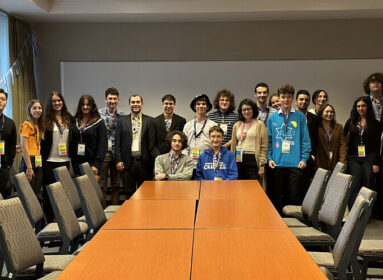
Connecticut rabbis apply the Torah’s teachings to a hot-button issue
By Cindy Mindell
Anyone who has sat at the seder table knows the basic Jewish attitude toward immigrants: “In each generation, each person is obligated to see himself or herself as though he or she personally came forth from Egypt.”
In the Torah and Talmud, there are no fewer than 35 directives about how to treat the stranger. But in modern times, as the public and legislative debate over immigration reform unfolds, how are Jews supposed to interpret and act on the ancient teachings?
Like every law and policy, Torah can be interpreted and carried out in many ways, says Rabbi Nelly Altenburger of Congregation B’nai Israel in Danbury, who immigrated to the U.S. from Brazil in 2001, just before 9/11.
Take, for example, the oft-quoted passage in the pro-immigration community, Leviticus 19:33-34. In the directive, the Jews are commanded to treat the stranger or alien – ger in Hebrew – as ezrach, Hebrew for “citizen” in some translations and “native” in others.
From the Jewish Publication Society of America 1985 translation:
When strangers reside with you in your land, you shall not wrong them. The strangers who reside with you shall be to you as your citizens; you shall love each one as yourself, for you were strangers in the land of Egypt; I the Eternal am your God.
From Chabad.org: When a stranger sojourns with you in your land, you shall not taunt him. The stranger who sojourns with you shall be as a native from among you, and you shall love him as yourself; for you were strangers in the land of Egypt. I am the Lord, your God.
While both translations indicate that the pre-Diaspora Jew was not to mistreat foreigners, what does it mean for the modern-day Jew to welcome a foreigner as a “native” or a “citizen?” The Torah doesn’t offer detailed instructions for Jews in either era.
“I do think that our history begs the question of what it means to build a fence around the Torah; some want to use it to justify building a fence around the country,” says Rabbi Herbert Brockman of Congregation Mishkan Israel in Hamden. “The rabbis say that it’s not to keep people out but to draw a circle around and keep people loyal to Torah. One has to be careful when they discuss their loyalty and nationalism – especially we, who certainly in the last 2,000 years, were searching for a safe and secure haven.”
The idea of welcoming the stranger speaks to the Jewish historical experience in a unique way, Brockman says.
Mishkan Israel, founded by Bavarian Jews in 1840, has long been involved in welcoming the stranger. In the early 1880s, the congregation was renting apartments in downtown New Haven for Russian Jewish immigrants fleeing the restrictive “Temporary Regulations Regarding the Jews,” or “May Laws.”
Fast-forward 110 years, when the Iron Curtain was raised, and the congregation sponsored seven Jewish refusenik families, renting apartments for them, helping the parents find jobs, and helping them acclimate to their new community.
And the Hamden shul was not alone. In the ‘70s and ‘80s, and until the Iron Curtain was dismantled in 1991, Jewish institutions throughout Connecticut – Federations, synagogues, day schools, Jewish Family Service agencies – joined forces to help resettle the wave of Jewish families fleeing from an oppressive Soviet Union.
“At the time, we talked about what it means to have an obligation to our fellow Jews,” Brockman says. “But the conversation didn’t end there.” In 1994, during the Yugoslav Wars, Mishkan Israel helped resettle a Bosnian Muslim family. The acculturation process wasn’t without its issues; in the end, the family was relocated to the small Bosnian Muslim community in Wallingford, where they felt more comfortable.
“Our congregation wondered whether we had failed,” Brockman recalls. “But you do a mitzvah for you, not necessarily for the recipient of the mitzvah.”
When the war in Iraq intensified, Mishkan Israel brought over an Iraqi Muslim family and helped them resettle in West Haven, where there is a large Muslim community. The synagogue hosted iftar, a break-fast during Ramadan, and invited the local Turkish community to participate as well.
“We do that because who could not think about the St. Louis being turned away in 1939 with 900 Jews from Europe?” Brockman says. “If we don’t do that, history is just a tragedy, and we go from one tragic experience to another unless we can turn into something positive. It doesn’t make a tragedy not a tragedy, but it’s a transformation of the tragedies of Jewish history.”
Only the Jews would create an escape route to Israel for persecuted peoples like the Falashas of Ethiopia and Bahá’í of Iran. “What in the world is the Bahá’í community doing in Haifa?” Brockman says. “In Iran they’d be killed, so they found a home there. And they’re an incredible part of the Israeli community.”
So now, looking at U.S. immigration policy circa 2014, Brockman asks a simple question: “If this were about the Jews in 1939, what would we have wanted the U.S. to do then that it didn’t do? That’s what we have to do for others. It makes our Holocaust-related tragedy an eternal tragedy if we don’t do something about the immigration situation now, if we don’t speak out.”
These actions hint at returning a favor. Albania, with a 70-percent Muslim population, was the only Eastern European country that had more Jews at the end of World War II than before the war. That’s because of the Albanian Muslim cultural precept of besa, usually translated as “faith” or “word of honor.” The principle led the Albanians to welcome persecuted Jews as members of their society, hiding them in plain sight with Albanian clothing and names. Brockman has a different interpretation of besa, pointing to its similarity to beiti, the Hebrew and Arabic word for “my home.”
“This notion of besa or beiti – a place where you’re welcomed – is a Middle Eastern tradition,” he says, one that Jews should remember to uphold. After all, it was American Jew Emma Lazarus who wrote the iconic sonnet, “The New Colossus,” after witnessing the “huddled masses” being processed at Ellis Island in the early 1880s. “She was shocked at their condition and wrote about what we, as Americans, are supposed to be,” Brockman says. “She wrote that as an American Jew, but, like honey dripping from the fingers that held the pen, it was Jewish juice that flowed through those words.”
Two who came through that port a half-century later were Leon Chameides and his adoptive mother. A Polish-Jewish native who had survived World War II as a hidden child in a Ukrainian monastery, Chameides would eventually settle in West Hartford and become a well-respected pediatrician.
At the end of the war, having lost his parents to the Nazis, he and his adoptive mother were living in Poland. His maternal grandparents, an uncle, and two aunts had managed to get to England just before the start of the war. When they learned that he had survived the war, they arranged with the Chief Rabbi’s Religious Emergency Council to bring the pair to England.
“We arrived in England on Dec. 31, 1945 on a tourist visa valid for one month,” Chameides recalls. “The entry passport agent asked us whether we wanted to stay longer and when we nodded, he crossed out ‘one’ and substituted ‘six.’” Chameides’s adoptive mother had applied for immigration to the U.S. before the start of the war. While the two of them waited in England, she was not permitted to work and they had to report to the local police every six months for a visa extension. Finally, three-and-a-half years later, in 1949, they received permission to leave.
They arrived in New York on the Queen Elizabeth on June 14, Flag Day. Chameides received his U.S. citizenship in 1954.
“Theoretically, the United States has been a very welcoming country to immigrants and has benefited greatly from the contribution made by the various waves of immigrants,” Chameides says. “But the size of the welcome mat has varied depending on the ethnic origin of the immigrant group and the historic time. For example, the Chinese were not permitted entry into the country from the early 1880s until World War II, when [the U.S. government] discovered, in embarrassment, that China was an ally. European immigration was welcomed until 1924, when it was almost completely halted. At the moment, the United States is not very friendly to immigrants and this issue really needs to be revisited by Congress. Unfortunately, this is unlikely to be done in the current political climate and I therefore applaud Pres. Obama for trying to do whatever he can, within the limits of the law.”
Chameides believes that Congress must consider three main points as part of immigration legislation. A limit to total annual immigration must be set so that job availability, housing, and other limited resources are not outstripped by the number of new immigrants. Priority should be given to immigrants with certain skills. “It is unpardonable to educate foreign students and then insist that they return to their home countries,” he says. Current undocumented residents must be approached charitably, with decisions as to their eligibility made on an individual basis. Family units should not be broken up and those who came to the U.S. as minors and received their education here should be allowed to stay, together with their parents.
Like Congregation Mishkan Israel, Beth El-Keser Israel (BEKI) has been involved in resettling newcomers in the New Haven community as part of its tikkun olam activity.
BEKI works in partnership with Integrated Refugee & Immigrant Services (IRIS), a program of the Episcopal Church in Connecticut and the local affiliate of Episcopal Migration Ministries and the Immigration and Refugee Program of Church World Service.
The congregation got involved with IRIS in 2012, after executive director Chris George spoke at the synagogue to enthusiastic response. Just before Passover, IRIS was placing a family of refugees from Darfur in an apartment within walking distance of BEKI and asked for help.
“The congregation really rallied,” says Cynthia B. Rubin, an involved BEKI member. “People were cleaning their houses and kitchens for the holiday, so the timing was very good in terms of being able to greet and help the family.”
The congregation next helped IRIS with an Iraqi family who moved into the same neighborhood.
“A lot of people have moved on to other volunteer activities but their awareness of the immigration situation was helped by having this personal touch and bonding with ‘real’ families,” Rubin says. “Working directly with new arrivals reminds us of the transitions that our own parents, grandparents, and great-grandparents went through and stay in touch with their family stories.”
In addition to BEKI’s involvement with the refugee families, the JCC of Greater New Haven provided them with free memberships and engaged their children in summer programs.
“Sydney Perry was wonderful,” Rubin says, referring to the executive director of the Jewish Federation of Greater New Haven, who has been involved for more than a decade in the Save Darfur movement.
Now that the families have settled in, BEKI members stay involved through weekly tutoring sessions with the children at the New Haven library branch in Westville. “We’re interested in helping others, but this has also enriched our lives,” says Rubin. “Watching the kids adjust, develop, and grow is really satisfying, especially seeing them juggling the two different languages and cultures and seeing the light bulb go off. With the older kids, we have some discussions about life in two cultures, which helps us understand what it is about America that we like and the potential for us here. When the kids ask those questions, it helps us keep in mind what we have to safeguard here in order to keep others wanting to come here.”
A second family from Darfur is slated to arrive in New Haven.
When it comes to the Jewish approach to immigration policy, the truth is that there is no one right way, says Rabbi Nelly Altenburger, who came to the U.S. on a student visa to attend American Jewish University’s Ziegler School of Rabbinic Studies in Los Angeles. While there, she met her future husband and the two spent a year in Israel as part of the curriculum. They applied for a marriage visa and married the following year. The mother of four, Altenburger now has legal status in the U.S.
“I think something that we need to be very careful about is that the Torah can be used for anything we want,” she says. “If you want to support immigration, you can use the text; if you don’t want to support immigration, you can also find validation. We would like to know precisely what is meant in the Torah but we don’t. So we have to create meaning. It behooves us to admit that we’re making a choice and that we come with our own values toward the text.”
What Altenburger is certain of, regardless of her personal experience and politics, is that Jews have a moral obligation to help the weak. Even so, “I’m aware that it comes as part of who I am and where I come from and that I find my values in the text,” she says. “When it comes to applying what the Torah says, it depends on who you are and your politics, but the text supports being kind to the stranger and I interpret that as anyone coming into our country.”
Altenburger references the many Holocaust-era stories of Jews who were the ones at the gate, treated as strangers, and the many “righteous gentiles” who went out of their way to welcome and help them.
“We are taught that we are to remember strangers – we have to take care of the ger because we were strangers in Egypt,” she says. “But memory is not memory for its own sake. It is always connected with some sort of action. And that’s where we have a moral obligation to do something. What exactly we do is up for discussion.”
Conversation is the starting point for action. Altenburger raises social issues with her congregation, who then discusses choices and decides, as a community, what to do.
“I am grateful and lucky that most people in the congregation care about what is right, in the sense of giving everyone a fair chance,” she says. “So as we’re discussing these choices, we go from there.”
Obama’s order not to oppress the ‘stranger’ resonates with Jewish groups
By Ron Kampeas
WASHINGTON (JTA) — President Obama did not mention Jews once in his Nov. 20 speech announcing immigration reforms, but he ended with a flourish that would be immediately recognizable to anyone who has sat through a Passover seder.
 “Scripture tells us that we shall not oppress a stranger, for we know the heart of a stranger — we were strangers once, too,” Obama said in a live address from the White House in which he announced changes aimed at addressing the plight of millions of undocumented immigrants.
“Scripture tells us that we shall not oppress a stranger, for we know the heart of a stranger — we were strangers once, too,” Obama said in a live address from the White House in which he announced changes aimed at addressing the plight of millions of undocumented immigrants.
Obama’s biblical invocation resonated with many of the Jewish organizations that have praised his initiative in the face of sharp criticisms from congressional Republicans, who have accused the president of executive overreach.
“The president pointed to one of the core biblical basics, to welcome the stranger,” said Barbara Weinstein, the associate director of the Reform movement’s Religious Action Center here.
Obama took a relatively narrow action last month, delaying the deportation of parents of legal U.S. residents for at least five years and extending an earlier order granting legal status to illegal immigrants who arrived in the United States as children to those who arrived prior to Jan. 1, 2010. Additionally, undocumented immigrants who have been recognized as being exempt from deportation will be able to travel out of the United States and return unhindered.
The actions, which are believed to impact some four million to five million undocumented immigrants out of a total undocumented population estimated at 12 million, do not directly address the immigration issues that have traditionally exercised Jewish groups, among them refugees from religious persecution. Still, there was a sense of relief after years of deadlock on the immigration issue.
“It’s obviously something that so many of us have been fighting for so long,” said Melanie Nezer, the vice president of HIAS (Hebrew Immigrant Aid Society), the immigrant rights group that dates to the late 1800s. “We’re excited that for some people there is hope and relief and that it will make a difference.”
Under the new rules, children who were sent to the United States to escape violence in Central America will be able to travel to see their parents, sometimes after years apart. Hadar Susskind, the Washington director of the liberal advocacy group Bend the Arc, likened the situation to parents who handed their children over to non-Jews during the Nazi period.
“What this is really about is keeping families together, and that’s one of the most Jewish things out there,” said Susskind, who attended a White House briefing on the issue on the day of Obama’s announcement.
Much remains to be done, said Nancy Kaufman, the CEO of the National Council of Jewish Women, noting for instance that the actions do not address what has long been a focus of Jewish immigration advocacy: expanding access for those seeking asylum from persecution.
“We need to do for others what was not done for us when we needed an outreached hand during the Holocaust,” Kaufman said.
The American Jewish Committee (AJC) said in a statement that concerns about executive action may be beside the point.
“At this critical juncture, we underscore, as we have in the past, the urgent moral — and practical — need to bring undocumented immigrants out of the shadows,” the AJC said. “No matter where one stands on administrative action, the administration and the Congress should make it the utmost priority to work together in fashioning comprehensive bipartisan legislation that will provide for a permanent fix to our broken immigration system.”
Weinstein of the Religious Action Center said Jewish groups were ready to return to Congress to press for more sweeping reforms. Noting that Obama quoted Torah, she turned to the Ethics of the Fathers, or the Pirkei Avot.
“We are not required to finish the task,” she said, “but nor are we free to desist from it.”








 Southern New England Jewish Ledger
Southern New England Jewish Ledger










